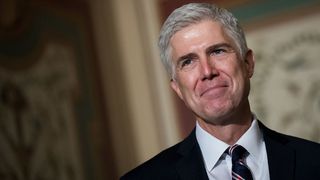Neil Gorsuch Confirmed to Supreme Court

After millions of dollars in TV ad time, four days of hearings, and the change of long-standing Senate rules, Neil Gorsuch, President Donald Trump's nominee to succeed the late Antonin Scalia as associate justice on the Supreme Court, has been confirmed.
The vote was 54 to 45.
The Senate Judiciary Committee voted along sometimes bitterly divided party lines (11 to 9) April 3 to approve Gorsuch, a judge on the U.S. Court of Appeals for the Tenth Circuit, for the seat, which has been empty since last February.
Related: FCC Asked to Review Neil Gorsuch Ads
Gorsuch was criticized by Democrats, and praised by Republicans, for the problems he has raised about the extent of Chevron deference generally accorded agencies—per Supreme Court precedent—to interpret vague statutes. He has argued that while agencies should get deference for their technical expertise in their subject areas, it should be up to the courts to do the clarifying of vague statues, and that giving federal agencies that power runs into equal protection and separation of powers issues.
Democrats fear that weakening Chevron is a way to weaken the ability of those agencies to protect the air, water and privacy—critics of the FCC's broadband regulation under former Democratic chairman Tom Wheeler argued that it was exceeding its authority in its interpretation of statute.
Republicans see Gorsuch's doubts about Chevron as a commitment to protecting the separation of powers and keeping all those powers within their appropriate limits.
"By faithfully enforcing the boundaries among branches of the government and the power of the federal government in our lives, this Justice will ensure that the law protects our liberties," said Senate Judiciary Committee chairman Charles Grassley (R-Iowa) just before the vote.
Gorsuch said that if the issue of overturning the Chevron deference doctrine came up in his role as a justice, he would "try to come at it with as open a mind as a man could muster."
The judge during his four-day confirmation hearing stood up for the value of anonymous speech when grilled about the Citizens United case and said another thing he would keep an open mind on was cameras in the court.
Broadcasting & Cable Newsletter
The smarter way to stay on top of broadcasting and cable industry. Sign up below
Contributing editor John Eggerton has been an editor and/or writer on media regulation, legislation and policy for over four decades, including covering the FCC, FTC, Congress, the major media trade associations, and the federal courts. In addition to Multichannel News and Broadcasting + Cable, his work has appeared in Radio World, TV Technology, TV Fax, This Week in Consumer Electronics, Variety and the Encyclopedia Britannica.

